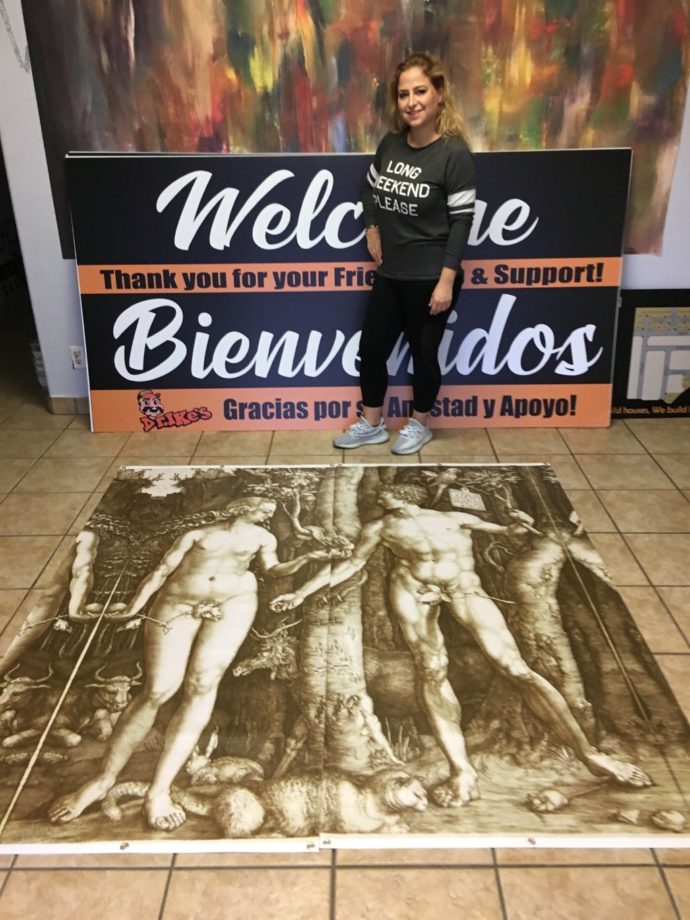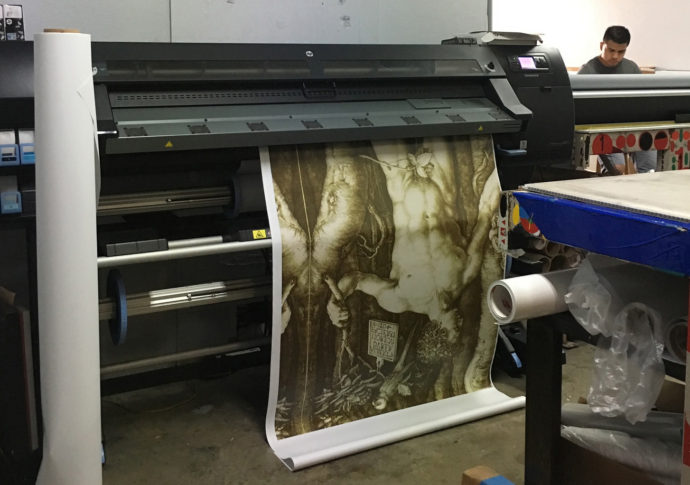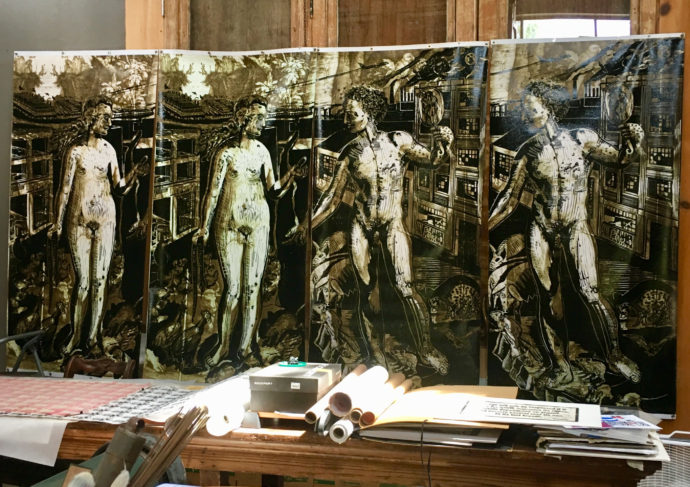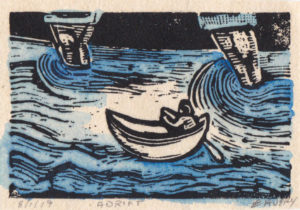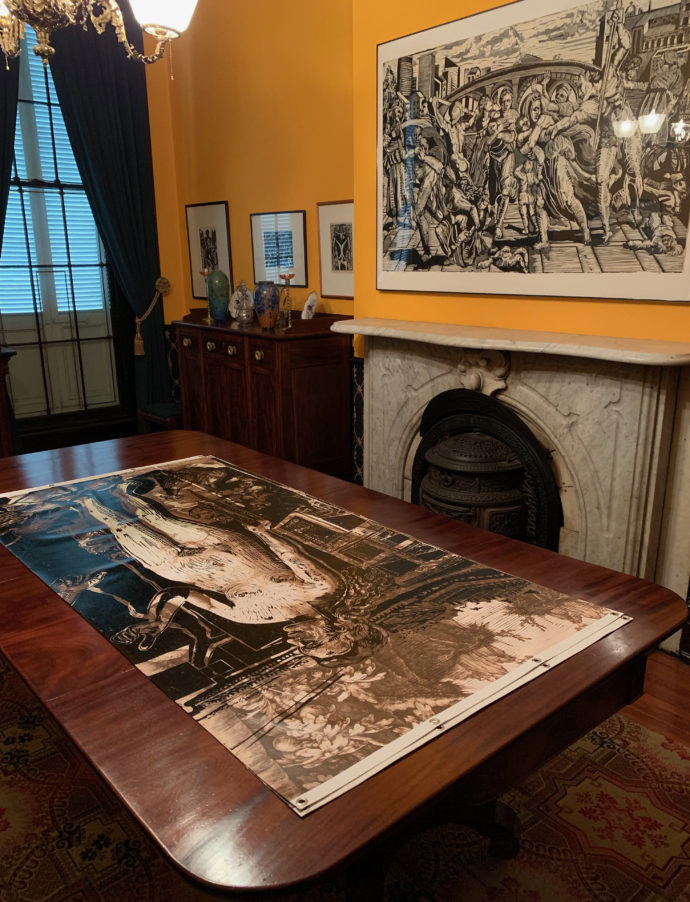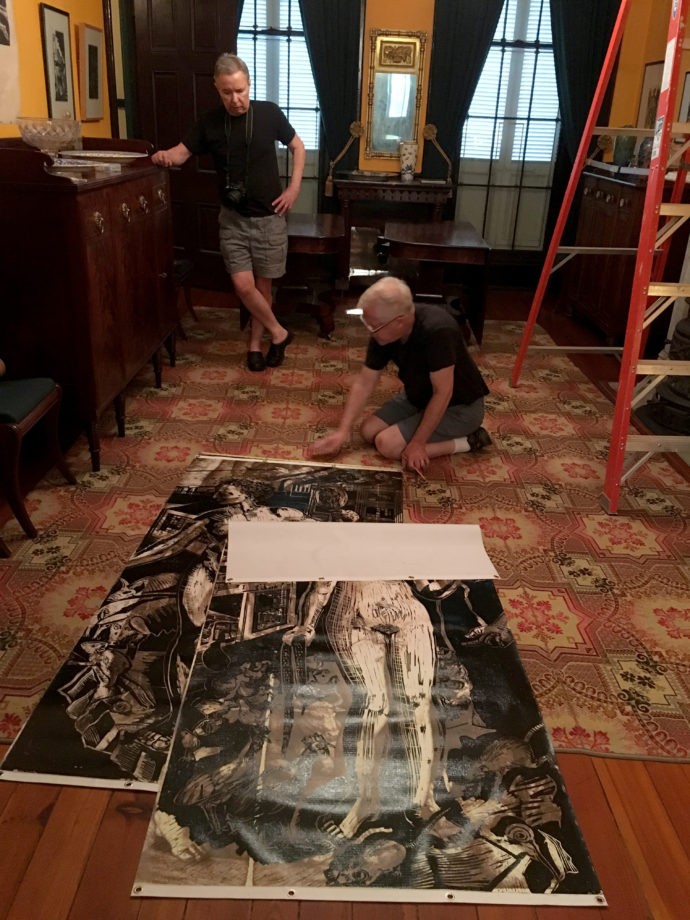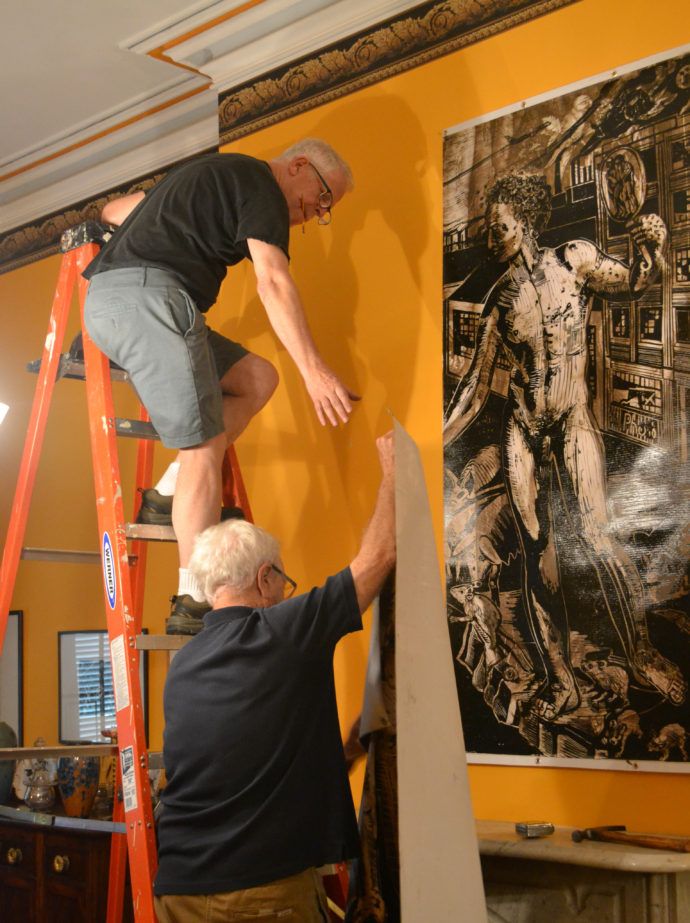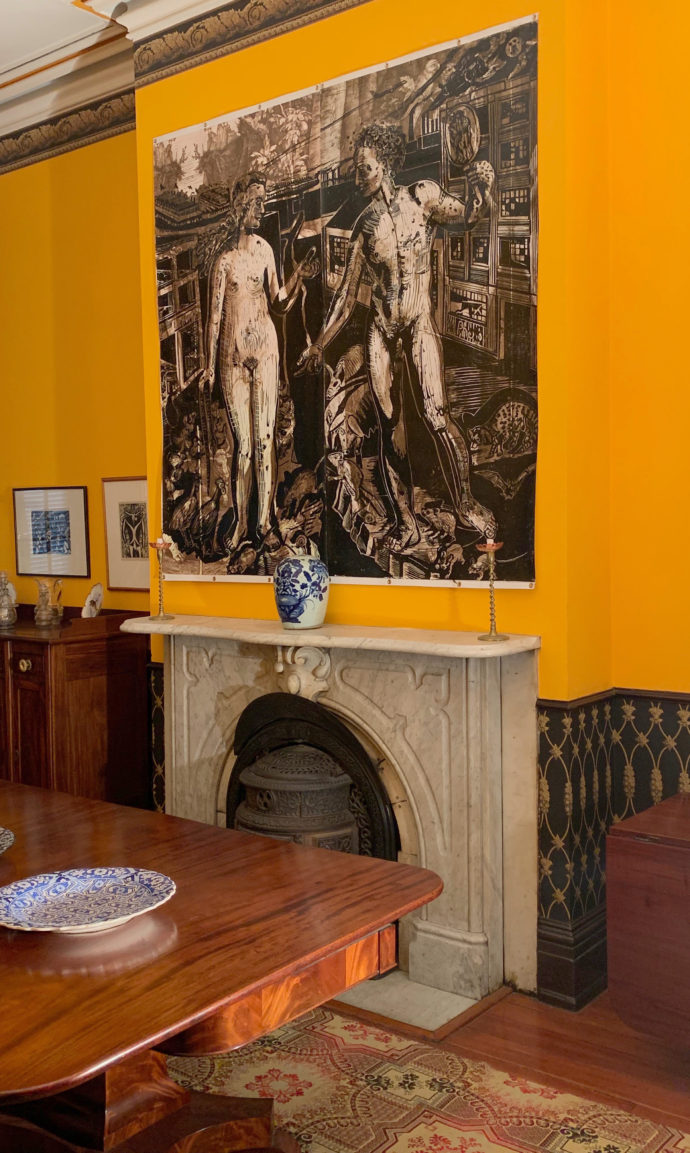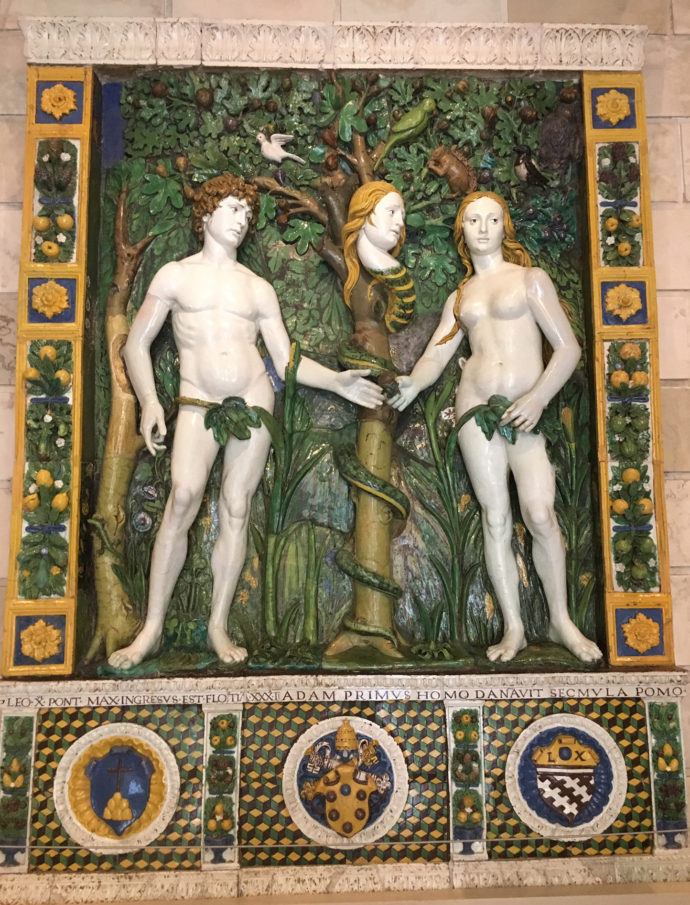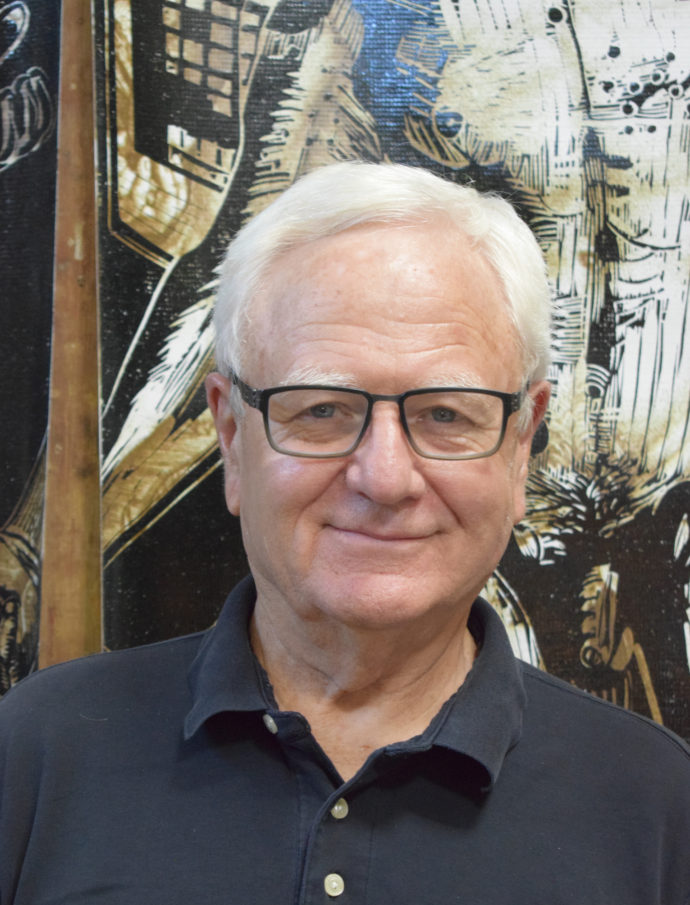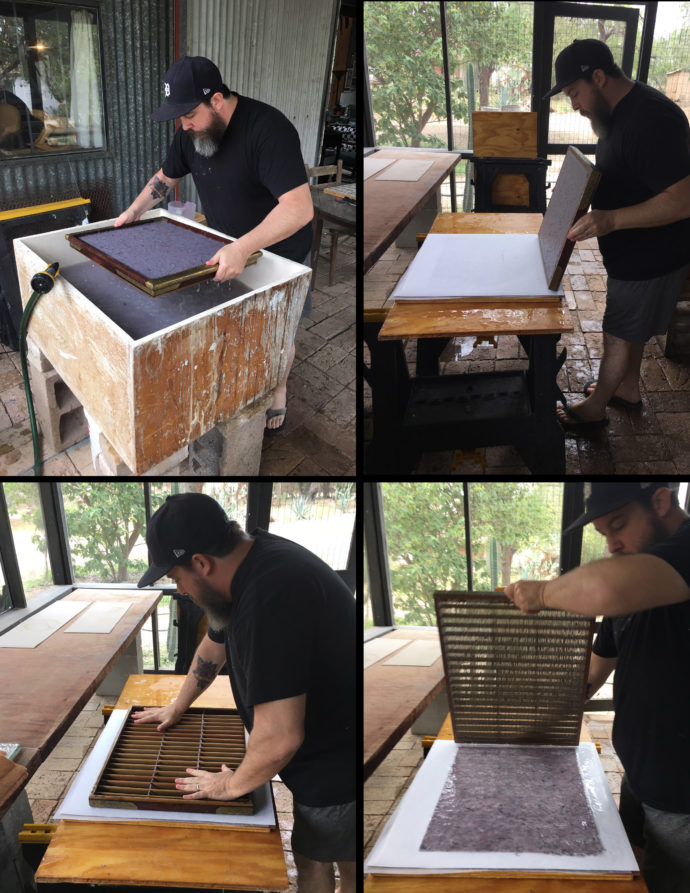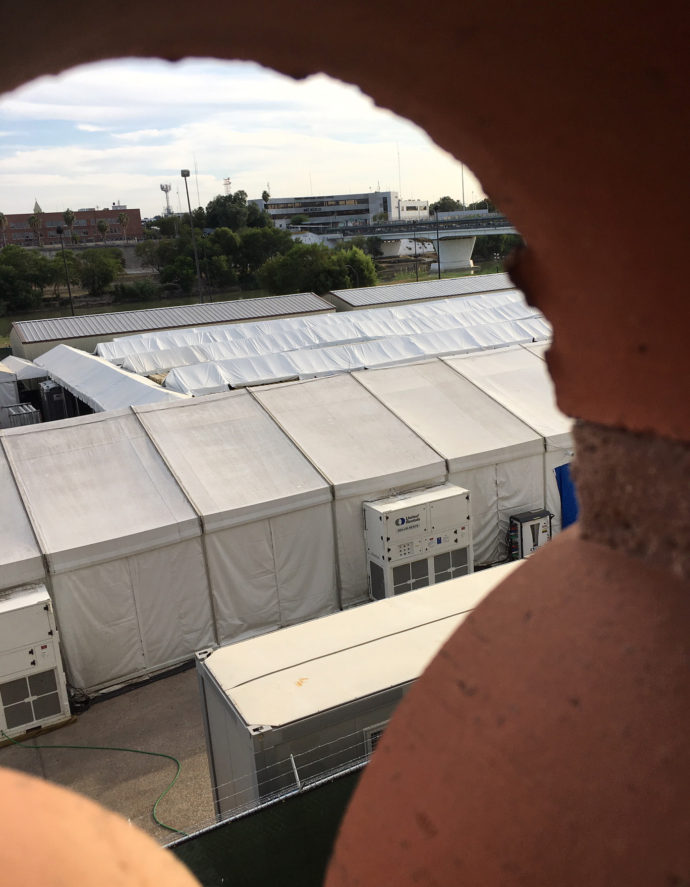ERIC AVERY: Paradise arrives
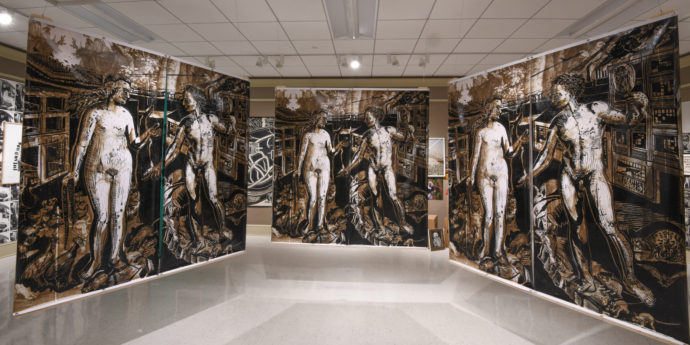
Three 6′ x 6′ pairs of Eric Avery’s “Paradise Lost” were hung to create an activities area during his “Epidemic” exhibition. Each pair begins with a computer-generated image of the Albrecht Dürer’s engraving “Adam and Eve” that Avery then overprints his linoleum block images. (Courtesy of Eric Avery)
Introduction
Some how in the process of completing my first ART I SEE blog post on artist Eric Avery (See http://www.scottponemone.com/eric-avery-doctor-of-printmaking/) last June, I got the bright idea that I would love to have a pair of his Paradise Lost banners, like the ones that were used for his and Adam DelMarcelle’s “Epidemic” exhibition last spring at East Tennessee State University’s Reece Museum. I thought they would look great opposite Avery’s Massacre of the Innocents linocut that has hung above my dining room fireplace since 1994.
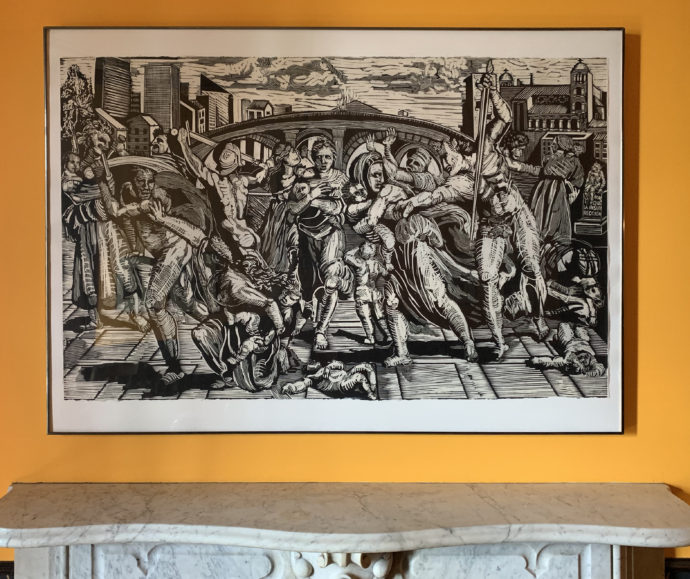
Eric Avery (American, born 1948), “Massacre of the Innocents,” linoleum block print on handmade Okawara paper, 37″ x 50″, 20/25, 1984. (Photo by Scott Ponemone)
So this post recounts what efforts–both via email and in person–were made to bring Paradise to my house. I’ll also touch upon what Eric and his cohort Adam DelMarcelle are doing to prepare for next spring’s venue for “Epidemic”: City Tech College [New York City College of Technology] in Brooklyn.
Paradise comes to Calvert St.
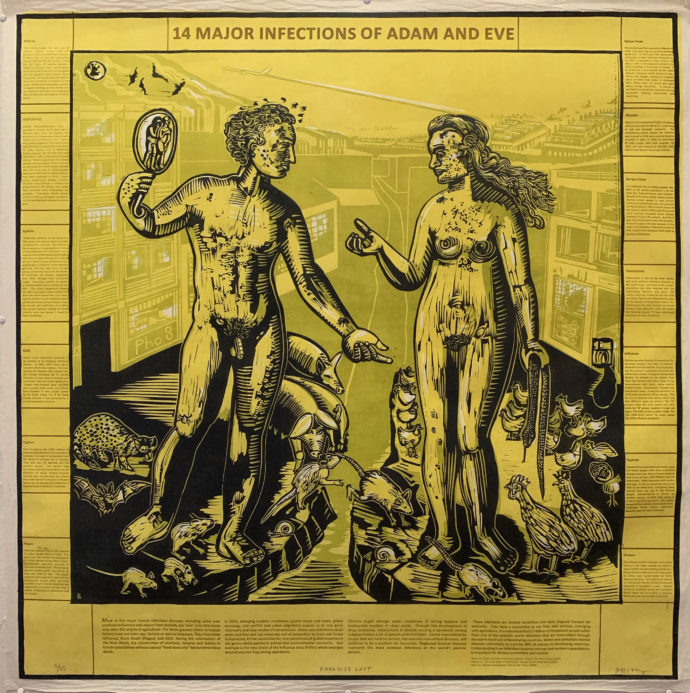
Eric Avery, “Paradise Lost (14 Major Infections of Adam and Eve),” 2010, 3-color linoleum print with polymer text blocks on Okawara paper, 36 1/2″ x 36″, edition of 25. (Photo by Scott Ponemone)
According to my stream of emails from Eric Avery, I expressed interest in having a set of Paradise Lost linocut banners by early June, 2019. I also asked about his chiaroscuro version (right) in three colors published by the Brodsky Center for innovative Editions for Philagrafika 2010 in Philadelphia. The text blocks that surround the image describe the infections: malaria, plague, AIDS, etc. Note that Adam is on the left in this version. This follows Albrecht Dürer’s famous 1504 engraving of Adam and Eve, which serve as the basis for Avery’s images. However the left-right orientation is reversed in Avery’s Adam and Eve banners.
Eric replied on 8 June: “Of course I can print another set of Adam and Eve for sale. I’ll get the banner’s made in Laredo. I attach a photo of Nora Flores. She taught herself to use the computer and how to use the largest printers I’ve ever seen, used for political banners.”
(Avery said the banners that hung at the ETSU exhibition were done in Johnson City, TN, with the help of his studio assistant Adam Case Leestma.)
Avery was corresponding as he was driving home to San Ygnacio, Texas, on the Rio Grande, after completing a semester teaching in Tennessee. On 11 June, he wrote: “I’m traveling back to my place on the border, seeing old friends and witnessing cancer enter my cohort. Leave Austin for San Antonio today…. I think there are no more 14 Major Diseases. I’ve one or two in a print drawer.” He offered to sell me one. (I’m omitting prices in this post.)
As to the banners, he said, “The business of art sucks and I’ve no one-no dealer to help me for years. I sell the rare print on a case-by-case basis. If you wanted me to print the large Adam and Eve I think $…. for each of them would be fair. If you wanted them and need to pay over time we could do that.
“That’s enough on the business of art–I agree no awkwardness–I’m honored to know you like and appreciate my prints.”
On 26 June, Avery said Flores had printed one set of banners for a patron in Austin, but then she left for Mexico because her brother was gravely ill and on life support in Cancun. But now she is back and “she is printing the A and E set for you now. Yesterday, I figured out ink and printing for the Austin set. They look great.”
He added he will start printing his linoleum blocks on top of Dürer’s Adam and Eve. “They take a week to dry. I’ll send you photos. You will need a large wall. The two prints together make a 6’x6’ print. Grommets at top and bottom, so it will be easy to hang.
“While Nora is printing, I’m taking toiletries to one of the church places here receiving refugees. Hundreds are being bused to Laredo from other places along the border. This is a wild frontier. How I ended up here after Somalia is another story.”
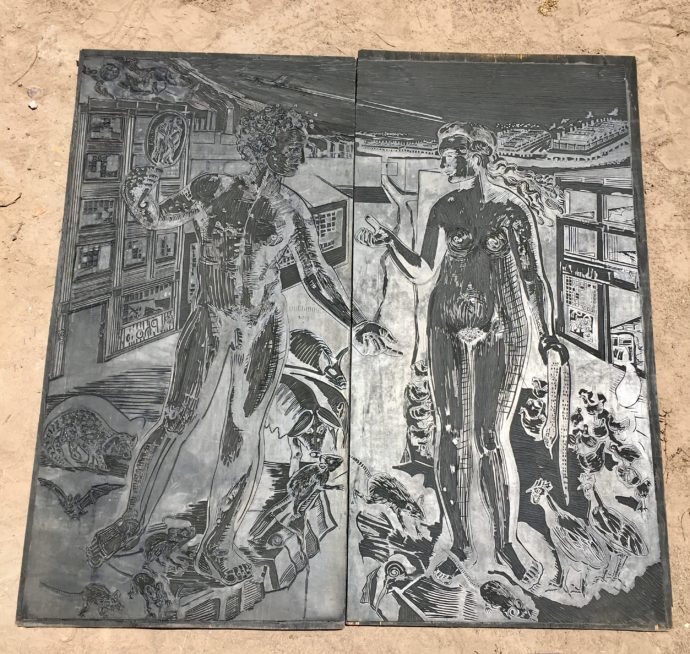
Avery’s linoleum blocks for “Paradise Lost” banners. They are mounted on plywood. (Courtesy of Eric Avery)
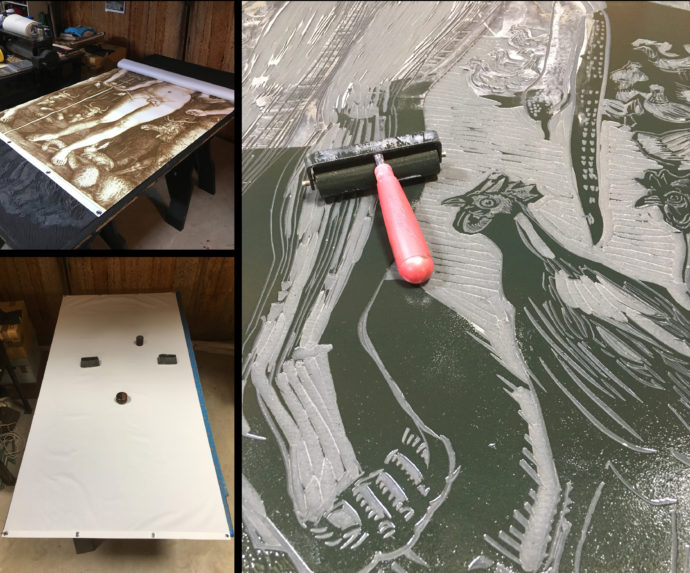
(Top left) The Eve banner sits atop its linoleum block. (Right) Closeup of the Eve block with brayer. (Bottom left) The Eve banner is positioned facedown atop the inked up Eve bloc with three weights to help hold position and a wooden door knob serves as a baren to rub the back of the banner to transfer the image of the block onto the banner. (Courtesy of Eric Avery)
On 27 June, Eric reports: “I’m printing the last Eve this morning. The ink dries shiny and sits on top of the vinyl. Your dinner guests will ask if it’s still wet and will want to touch the print. The ink is half Tom Huck black and half Hancock Burnt Umber litho ink. Makes a warm black to work with brownish Dürer. Transparent base, plate oil and miracle gel to modify. Printing using a speedball brayer and a door knob rubbing device for the back of print.
“Once banner is in place, weights keep it in place. Back of banner is ready to be rubbed with the wooden baren. It’s lifted so the block can be partially inked. Then banner is folded back down. This is repeated to ink top part of the block. I start in center and move out to edges. It takes about four hours, lifting the vinyl to check printing.”
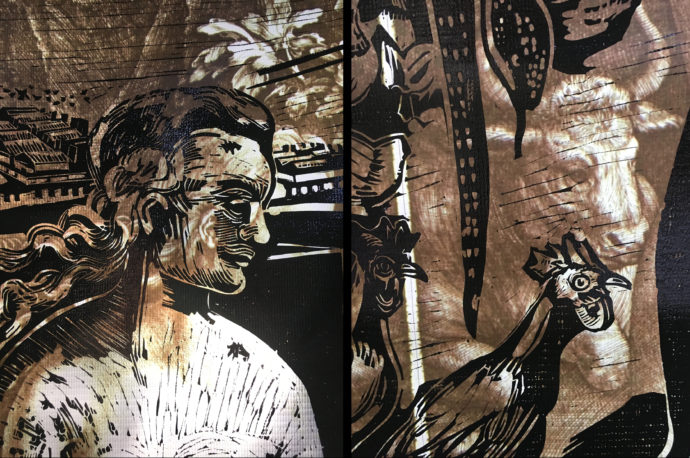
Details of the finished Eve banner. Avery noted the alignment of his Eve over Dürer’s Eve. He said, “Eve ends up with Dürer ear below her eye in her cheek.” (Courtesy of Eric Avery)
When Avery completed printing the second set of Adam and Eve, he sent me a photo of both sets.
Avery said, “The inner set of banners were made first. The outer prints were on banners made yesterday. Today I notice a slight shift in color of first Eve, like beautiful moonlight. You decide if you want inner or outer set?”
But on 2 July, Avery expresses his disappointment with the new sets. “I’ve been trying to get matching Adam and Eve’s from the Laredo printer. Eve keeps coming out different from Adam. I’m going to sell you one of the sets from the ETSU exhibit. I’ll get it to you in three weeks. Are you okay with this?
“I’m learning about digital printing in this process. Nora and I are making something beautiful in this desperate place on the US-Mexico border. It should be difficult.
“The ETSU sets are stored in Adam DelMarcelle’s house, in his deceased brother’s room with the rest of “Epidemic.” I’ll get them from Adam when we meet next in Philadelphia for our week’s intensive litho class.”
By 8 July, Avery wrote about his plans to travel north: “I’m focused this week on leaving Monday for 6-8 weeks. It’s 101 now and on the way up to 105 at 5 pm. August is the hottest month in South Texas. I’m comfortable in my studio but 10 minutes outside is exhausting.” He also asked for my mailing address because “when I get your A and E, I can safely put them in a tube and send them. The vinyl banners are very strong. We can figure this out when I get them from Adam.”
Besides the litho class in Philly, he was traveling north to be with David, his long-time companion in New Hope, PA. On 20 July, he wrote: “I had just arrived in New Hope when you emailed. I meet Adam on Monday for the week litho intensive class. I’m going to ask him to bring me the three sets. He only needs one set for Brooklyn.
“If you are willing to drive to New Hope, you could pick the set you want and meet David. He told me this morning that he thought we should get married. Of course I said yes–before he changes his mind. Or next week I could have them at PAFA and you could pick them there and meet Adam.”
But his plans changed. On 24 July , he wrote: “Today I got the Adam and Eve prints from Adam. You didn’t hear back from me because my personal life has become insanely complicated. I might end up bringing them to you on my retreat to my studio and life in Texas…. I’ll be in touch as the way forward becomes more clear.”
In another email on the same day, he added, “One source of my art is deep pain. We all suffer–again and again. I’m blessed to be able to use art to express it. Paradise Lost. I’m also blessed to have a higher power and awareness of the mystery of it all and good friends.”
By 28 July, he wrote to say he would be driving back to Texas and would be bringing Paradise Lost, arriving 1 July and staying overnight. Upon his arrival he handed me his tiny linocut “Adrift” that he must have completed that morning. It seemed to sum up the state of his relationship with his New Hope David.
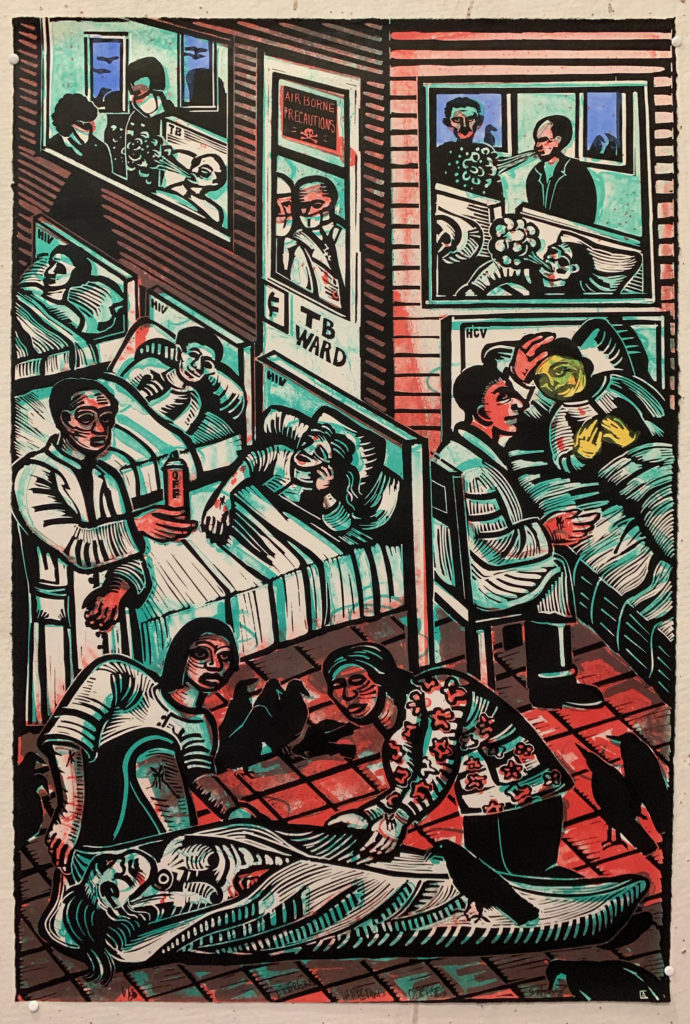
Eric Avery, “Emerging Infectious Diseases,” 2000, linoleum block over litho on Mulberry paper, 44″ x 22″, ed. 35. (See on Avery’s docart.com website at: http://www.docart.com/catalog/EIDS.html)
Installing Paradise and moving Massacre
Eric Avery’s visit to my Baltimore home was truly fun. We had great conversations. Several times I wished I was recording them. Isn’t it odd in these times that rare face-to-face encounters produce no record but cement friendships, while emails leave an indelible record but can be empty of emotion. My husband Michael and I certainly enjoyed cooking for him.
Not only did I purchase a pair of Paradise Lost banners but agreed to buy a copy of 14 Emerging Infections of Adam and Eve. In turn, Avery gave me a copy of Emerging Infectious Diseases, a linoleum over litho from 2000. Ironically in the days leading up to his arrival, I decided that the best place to hang Paradise was where his Massacre of the Innocents had hung since 1994, i.e. over the dining room mantle. Massacre, in turn, would move above the mirror in our bedroom. Its principle figure is a nude soldier. So it fits well in our bedroom print section. (See http://www.scottponemone.com/print-collecting-how-they-got-here/ which discusses all the prints that hang there and how and why they got there.)
So lacking recorded conversations, here’s a photo essay on hanging Paradise and rehanging Massacre.
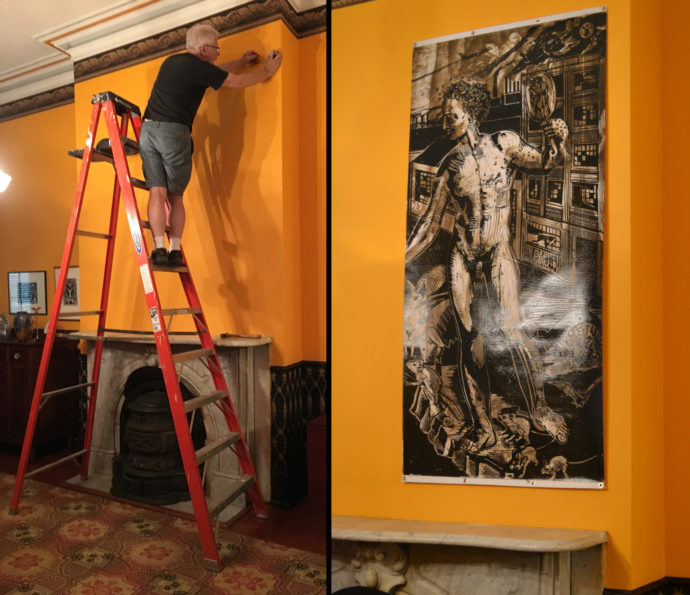
I measure the wall for the placement of Adam (Left) and Adam in place (right) (Photos by Michael Frommeyer)
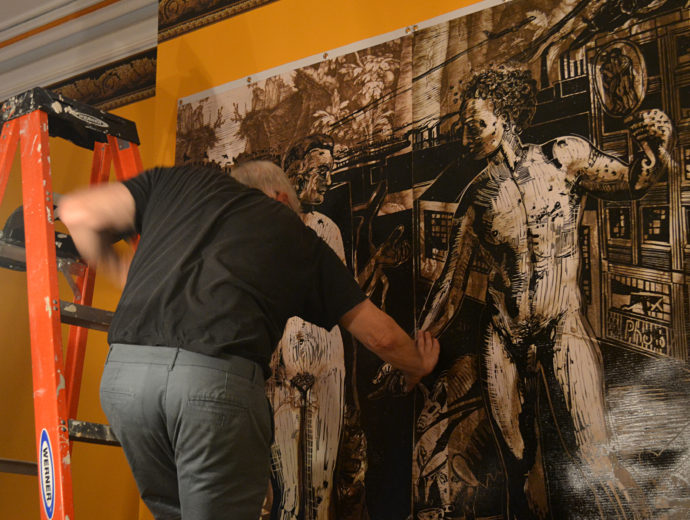
I make sure the seams line up. Later I would place very small loops of carpet tape to hold the seams down. (Photo by Michael Frommeyer)
The next move was to hang Massacre above the over-mantle mirror in our bedroom.
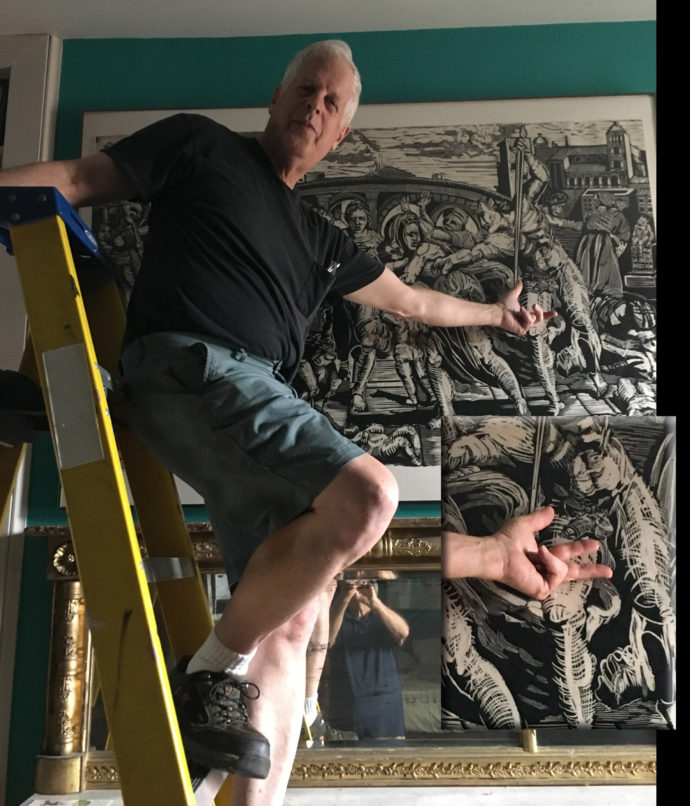
Avery took these photos after his “Massacre of the Innocents” was hung in the bedroom. It was his idea for me to appear to tweak the penis of the sword-bearing soldier. (Photos by Eric Avery)
Before he left Baltimore, Eric paid a visit to the Walter Art Gallery. Not surprisingly, he found this of interest there:
And some how before he left we failed to do a selfie together. So, at my request, when Adam DelMarcelle visited San Ygnacio, he photographed Avery. Any chance the placement of Avery beside the penis of Adam from Paradise was accidental?
BACK in San Ygnacio
In preparation for bringing “Epidemic” to Brooklyn’s City Tech College, Adam MelMarcelle joined Avery in San Ygnacio in October 2019 to use his paper-making facilities.
On 21 Oct. Avery wrote: “The paper-making over five days went very well. It was fun teaching and working with Adam. All parts of my paper studio are working, and I’m in love with my new paper press. Three Texas AM International University students and their printmaking professor Jesse Shaw visited and made paper. Jesse sent me photos of my studio/living space. I opened the sliding door on the South side of my studio to let in more light and Adam and Eve was back-lit.”
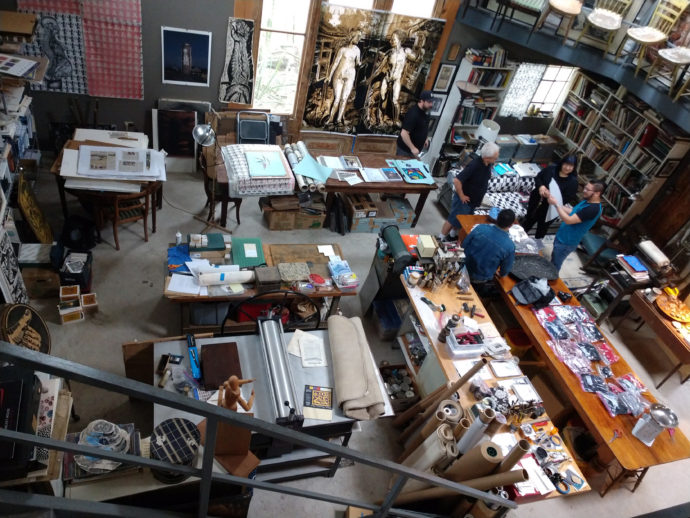
Bird’s-eye view of Eric Avery’s San Ygnacio studio. Note the light coming through the pair of “Paradise Lost” banners. (Photo by Jesse Shaw)
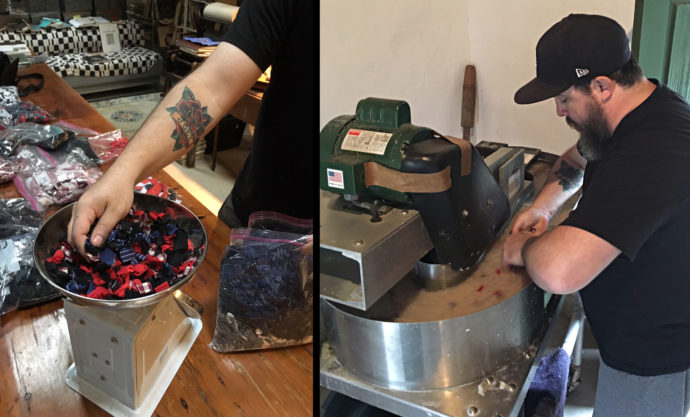
(Left) Adam weighs squares of cotton fabric. Note his tattoo in honor of his brother Joey, who overdosed. (Right) Adam at the paper-making machine. (Photos by Eric Avery)
For the paper, Avery said, “Adam had cut up cotton clothes from people who died of overdoses, including his brother Joey–tattooed on his arm. After soaking overnight, the rags were added to a base pulp of white cotton rags and abaca. The rags colored the pulp. He wanted to beat the rags until they came apart, leaving threads visible in the sheets. The beating of the fiber takes about 4-5 hours. The mould and deckle are dipped in the vat on my porch, then couched onto pelons and felts.”
When I asked Avery what use the sheets of paper would be put to, he said the goal was to product 200 sheets and gave them a name: “opiate death paper.” He explained:
“200 = number of opiate deaths in USA each day. The sheets of paper will be installed in Adam’s brother Charlie’s 24-hour performance piece “Shadow” about 13 people who died, including their brother Joey. Charlie DelMarcelle is a theater professor and actor in Philadelphia. Each sheet contains clothing from all the families who donated for the project. I’ve suggested to Adam that the sheets cover a wall in the installation space that might be used for a projection by Adam, but this is a decision for Adam and the set designer. I’ve just helped make the paper for the exhibition.
“The theater performance is part of the next iteration of “Epidemic” exhibition next year in Brooklyn. We had art + dance at ETSU [East Tennessee State University]. Now we add another humanities approach to the opiate crisis in Brooklyn: art + theater.
“It’s still evolving. First Adam received the clothes to make the paper. He said he could smell the person who wore the clothes when he opened the packages. When they get the stack of 16” x 20” sheets next week, looking like a stack of shadows the next decision will follow.”
Rio Grande reality
During Adam’s visit, Avery said, “We took some time to explore Laredo, 30 miles up the Rio Grande from San Ygnacio. We had lunch at the La Posada hotel. Our Custom and Border Protection has put the egregious INS refugee (denial) asylum hearing tent complex in the parking lot behind the hotel. It’s not accessible to the public or the press. [But] here is a view of the place through the wall of the parking lot. Nuevo Laredo Mexico is in the distance and the bridge between USA and Mexico.
Trackback URL: https://www.scottponemone.com/eric-avery-paradise-arrives/trackback/


